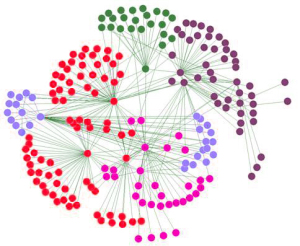“Life is a series of natural and spontaneous changes. Don’t resist them; that only creates sorrow. Let reality be reality. Let things flow naturally forward….” – Lao Tzu
As I was saying good byes to friends and ex-colleagues in Finland earlier this year, many encouraged me to write about my experiences of transitioning back to India, after more than a decade of living in the U.S. and Finland. In addition to personal experiences, some were also curious to hear more about India through the eyes of someone they could relate to.
For other readers, in a personal development context, may I suggest the self awareness question for your thinking – “What defines you?”
Considering that Finland and India are worlds apart in many respects, this transition involved big readjustments.
The early stages of moving back involved feelings of fuzziness. It was a feeling of being in different places at the same time. There was a mix of sadness and happiness, thinking about what would be missed and gained. It involved letting go of personal comfort zones, habits and relationships built over the years.
There were early readjustments. After having gotten used to the silent environment in Helsinki, even adjusting to the general noise levels was a change. I live in a smaller city in the south of India (Trivandrum, Kerala) which is more laid back and easier to navigate compared to many other larger cities. Life brought a difficult turning point, when my mother passed away after a month of my arrival. Pain and challenges tend to lead to a yearning for spiritual advancement. My efforts during previous years to understand spirituality deeper helped to focus on life from a larger wisdom and perspective.
I’ve wondered – Does wisdom find you or do you find wisdom? What leads you or vice versa to you, certain things, people or circumstances that seem to be outside the predictable flow of things in life?
On the professional side, I had decided to move in an independent path of consulting and coaching. This involved figuring out new ways of working. Working from home on my own was an interesting adjustment process. Trying to build connections in a place that I had not spend much time during the past decade was another. In many ways, it felt like starting from scratch. There was a sense of frustration and impatience creeping in and a need to manage that. I traveled to Delhi and Chennai to meet with contacts and attend a national HR conference. Those experiences were helpful to get a wider view on some cultural and professional aspects. Some ex colleagues and friends were gracious in meeting and responding. There were disappointments in my mind with few others – I realized it was due to my own expectations mostly of others without thinking about or knowing their perspective. Life seems to become a lot easier and less complicated when we let go of judgment and expectation of wanting others and things to be our way. Learning to deal with that was important personal progress.
It also gave me an impetus to write more and channel positive energy. A high school friend who is currently working on a book and involved with the publishing world, helped create new blog page. In around three months, there have been close to1000 unique views from 45 countries. I am grateful for the many encouraging responses and feedback.
On the personal exercise front, after enjoying squash (learning to lose painfully 🙂 a lot before starting to win) for the last four years personally, I am yet to pick up a new game and get back to the active exercise mode. Squash courts are hard to find. Some of that relates to me trying to find my new enjoyable zone.
Regarding general experiences in India:
The process flows and government interfaces are improving slowly and surely for citizens. Another positive aspect I experienced personally is meeting more grounded individuals in positions of power in the public and private spaces, who are aware of the intelligent use of power and want to make a positive change and impact. Experiences in India can vary considerably depending on where one is located.
Readjustments also involved getting used to how things work. Many things (public or private sector) did not seem to work smoothly and to the expected or communicated timeframes. It also seemed to take multiple follow-ups until something got unnecessarily complicated. Time still seems to be a flexible concept and delays are normal. Communication styles are still mostly top down and hierarchical and the frontline staff in most places are not empowered to make changes for customers. Small business owners say that they still can’t trust work to get done if they’re not micromanaging their staff. Many things get completed faster depending on where, who and how the request comes. Social status and networks plays a major role.
India continues to develop. Infrastructure is much better but there is a long way to go before getting to world class. The progress may be in bits and pieces. It is encouraging to see the new central government emphasize major infrastructure development and change in attitudes and habits. Connectivity, accessibility and ease of travel are much better. The impact of information technology is widespread, with many process being connected to the internet. Unlimited internet at home is not unlimited at the same speed – the access speeds reduce dramatically after a certain data transfer amount depending on the type of connection packages you take. The cars on the roads have changed and the numbers have increased dramatically with most global car brands being present but the quality of many roads and traffic management need attention. Maintaining the current roads without potholes seem to be a challenge. One of my rough first hand experiences was a six hour journey in the last row of a state transport bus, which felt like sitting on a jumping ball. There seems to be lesser queue disruption than in the past. Public transport system is overcrowded during peak hours but provides much more options and comfort than earlier. Mass transport systems are still few in number. Basic utilities like energy and drinking water seem to be under stress and require a lot more planning for the future.
Some services are as good or better than anywhere in the world. I can order a cab sitting at home, for any time of the day or night. There are also apps now in many parts of India that even track our ordered taxi through gps, after we order. The Delhi metro seemed as good as any other metro system in the world but the rush hour traffic may become or already is over capacity. Global startup names like Uber seem to be building up in India quickly. I can also book bus, train or plane tickets seamlessly using apps or through the internet anytime – this was not easy even few years back. I could travel on the train by just showing my photo id and online ticket booking. Most major brand names are visible on the local store shelves and everywhere . The latest mobile devices and electronic equipments are quite visible.
Even though many things have improved tremendously, it is obvious that India is still difficult for foreigners or tourists to navigate practically on their own.
Back to my own experiences – Memories, recollections and emotions still remind me about my previous world, people and experiences. There are still days in which I distinctly picture internally my favorite walking path around the waterfront in Helsinki. What I miss most is my diverse conversations with my small group of friends and connections. Physical distance results in mental distances and grabbing a coffee together is no longer an easy option. As time passes, the distance grows. Close friends will remain close and the reconnection will be seamless but the nature of closeness shifts when the frequency of interactions drop. On the other side, old friends in India are still friends, but they have evolved as well and we are all in different phases. That needs rebuilding. Very few stay the same.
All this serves as means to deeper learning, wisdom, new paths, connections and a more evolved future. I am learning and unlearning without letting go of the valuable knowledge and wisdom acquired. With every new direction, life has led to unexpected new paths, people and experiences.
Feeling lost seems to be a familiar feeling before discovering myself in an evolving self. It has led me to a place of hope, belief and confidence to progress through new experiences stronger.
To my global friends, I hope and wish our paths cross again… There is some sadness in thinking that it may not happen sometimes but glad that destiny helped cross our paths. It may not have been total coincidence. I am a result of my experiences.
A special ‘Thank You’ to my good friends for your inspiration and encouragement, to share my experiences.
“We are travelers on a cosmic journey, stardust, swirling and dancing in the eddies and whirlpools of infinity. Life is eternal. We have stopped for a moment to encounter each other, to meet, to love, to share. This is a precious moment. It is a little parenthesis in eternity.”- Paulo Coelho, The Alchemist








Recent Comments